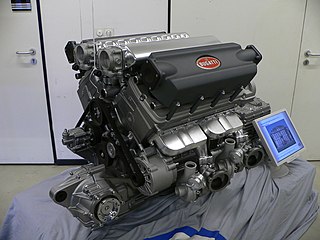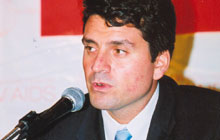
Franklin Pitcher Johnson jr., or Pitch Johnson, is a founder of multiple companies. [1] [2] [3]

Franklin Pitcher Johnson jr., or Pitch Johnson, is a founder of multiple companies. [1] [2] [3]
He is the son of Franklin Pitcher "Pitch" Johnson, an Olympic track and field athlete and college coach.
Franklin Pitcher "Pitch" Johnson was an American track and field athlete who competed in the 1924 Summer Olympics.
Track and field is an exercise which includes athletic contests established on the skills of running, jumping, and throwing. The name is derived from the sport's typical venue: a stadium with an oval running track enclosing a grass field where the throwing and some of the jumping events take place. Track and field is categorized under the umbrella sport of athletics, which also includes road running, cross country running, and race walking.
Encouraged by his father, Johnson won a track and field scholarship and studied mechanical engineering at Stanford University (1946–50). [1] After attending Harvard Business School (1950–52) he joined the US Air Force (1952–54) as an aircraft maintenance officer and worked in the Inland Steel Company's Indiana Harbor Works for eight years. He married Catherine Holman in 1954.

Mechanical engineering is the discipline that applies engineering, physics, engineering mathematics, and materials science principles to design, analyze, manufacture, and maintain mechanical systems. It is one of the oldest and broadest of the engineering disciplines.

Leland Stanford Junior University is a private research university in Stanford, California. Stanford is known for its academic strength, wealth, proximity to Silicon Valley, and ranking as one of the world's top universities.

Harvard Business School (HBS) is the graduate business school of Harvard University in Boston, Massachusetts. The school offers a large full-time MBA program, doctoral programs, HBS Online and many executive education programs. It owns Harvard Business Publishing, which publishes business books, leadership articles, online management tools for corporate learning, case studies and the monthly Harvard Business Review. It is home to the Baker Library/Bloomberg Center.
He has a wife Catherine, three sons and one daughter. He describes himself as an Episcopalian and a Republican. [1]

The Episcopal Church (TEC) is a member church of the worldwide Anglican Communion based in the United States with dioceses elsewhere. It is a mainline Christian denomination divided into nine provinces. The presiding bishop of the Episcopal Church is Michael Bruce Curry, the first African-American bishop to serve in that position.

The Republican Party, also referred to as the GOP, is one of the two major political parties in the United States; the other is its historic rival, the Democratic Party.
The US Congress passed a law in 1958 to foment the creation of venture capital under which the government would lend private capital. [1] Johnson and his friend, Bill Draper, decided to co-found a venture capital company in Palo Alto. With a combination of savings and family loans, they formed Draper and Johnson Investment Company (D+J) in 1962. Johnson then took courses at Stanford at age 35 to study molecular biology and computer science. These studies were later useful for his investments in biotechnology and informatics. He says that being "a local guy" has helped him, since he knew many local entrepreneurs, lawyers and other professionals. It was easier for him to "check out" potential business partners. [1]

Venture capital (VC) is a type of private equity, a form of financing that is provided by firms or funds to small, early-stage, emerging firms that are deemed to have high growth potential, or which have demonstrated high growth. Venture capital firms or funds invest in these early-stage companies in exchange for equity, or an ownership stake, in the companies they invest in. Venture capitalists take on the risk of financing risky start-ups in the hopes that some of the firms they support will become successful. Because startups face high uncertainty, VC investments do have high rates of failure. The start-ups are usually based on an innovative technology or business model and they are usually from the high technology industries, such as information technology (IT), clean technology or biotechnology.

Molecular biology is a branch of biology that concerns the molecular basis of biological activity between biomolecules in the various systems of a cell, including the interactions between DNA, RNA, proteins and their biosynthesis, as well as the regulation of these interactions. Writing in Nature in 1961, William Astbury described molecular biology as:
...not so much a technique as an approach, an approach from the viewpoint of the so-called basic sciences with the leading idea of searching below the large-scale manifestations of classical biology for the corresponding molecular plan. It is concerned particularly with the forms of biological molecules and [...] is predominantly three-dimensional and structural – which does not mean, however, that it is merely a refinement of morphology. It must at the same time inquire into genesis and function.

Computer science is the study of processes that interact with data and that can be represented as data in the form of programs. It enables the use of algorithms to manipulate, store, and communicate digital information. A computer scientist studies the theory of computation and the practice of designing software systems.
In 1965 he founded a venture capital company, Asset Management Company, which is still in operation. [2]
He helped found companies including Amgen, Biogen Idec and Tandem. [1] He said that as a rough estimate, of every 10 companies that he help found, one would return 20 or more times the investment, 3 or 4 doubled it, and the rest didn't lose nor win money, and they had to be sold, sometimes with losses and sometimes ending even. [1] Some don't succeed or fail and keep going: he calls them the "living dead."
He was later director of the National Venture Capital Association and of the Western Association of Venture Capitalists, and he was also a trustee of the Foothill–De Anza Community College District for 12 years. [2] He taught a class in entrepreneurship and venture capital for 12 years at Stanford Business School, and he remained active in the faculty through 2009. [2]
He is a member of the board of international advisers to the IESE Business School in Barcelona.
The Columbia Business School has a position named Franklin Pitcher Johnson, Jr. Professor of Finance and Economics, which was donated by his friend, Lionel Pincus.

William Henry Draper III is an American venture capitalist.

Draper Fisher Jurvetson (DFJ) is an American venture capital firm focused on early- and growth-stage investments in enterprise, consumer and disruptive technologies.
Franklin Resources Inc. is an American holding company that, together with its subsidiaries, is referred to as Franklin Templeton Investments; it is a global investment firm founded in New York City in 1947 as Franklin Distributors, Inc. It is listed on the New York Stock Exchange under the ticker symbol BEN, in honor of Benjamin Franklin, for whom the company is named, and who was admired by founder Rupert Johnson, Sr. In 1973 the company's headquarters moved from New York to San Mateo, California. As of March 2017, Franklin Templeton Investments had US$740 billion in assets under management (AUM) on behalf of private, professional and institutional investors.
T. Rowe Price Group, Inc. is an American publicly owned global asset management firm that offers funds, advisory services, account management, and retirement plans and services for individuals, institutions, and financial intermediaries. The firm, with assets under management of more than $900 billion at the end of 2017, is headquartered at 100 East Pratt Street in Baltimore, Maryland, and its 16 international offices serve clients in 47 countries around the world.

Mayfield Fund is a US-based venture capital firm that focuses on early-stage to growth-stage investments in enterprise and consumer technology companies.

Timothy Cook Draper is an American venture capital investor, and in 1985, the founder of the firm that would become Draper Fisher Jurvetson (DFJ). He also founded Draper Associates and Draper University. In July 2014, Draper received wide coverage for his purchase at a US Marshals Service auction of seized bitcoins from the Silk Road marketplace website. He also spent in excess of $5 million to push a ballot initiative to divide California into three smaller states, which has met the signature threshold but was removed from the ballot by a decision in the Supreme Court of California.
Igor Sill is a Silicon Valley venture capitalist.
The early history of private equity relates to one of the major periods in the history of private equity and venture capital. Within the broader private equity industry, two distinct sub-industries, leveraged buyouts and venture capital experienced growth along parallel although interrelated tracks.
Private equity in the 1980s relates to one of the major periods in the history of private equity and venture capital. Within the broader private equity industry, two distinct sub-industries, leveraged buyouts and venture capital experienced growth along parallel although interrelated tracks.
David E. Siminoff is a prominent Silicon Valley investor and entrepreneur, along with his wife, Ellen Siminoff. They met when both were students at Stanford Business School, married in 1994, and currently reside in Los Altos Hills, California.

James W. Breyer is an American venture capitalist, founder and CEO of Breyer Capital, an investment and venture philanthropy firm, and a partner at Accel Partners, a venture capital firm. Breyer has invested in over 40 companies that have gone public or completed a merger, with some of these investments, including Facebook, earning over 100 times cost and many others over 25 times cost. On the Forbes 2016 list of the world's billionaires, he was ranked #722 with a net worth of US$2.4 billion.
Foundation Capital is a venture capital firm located in Silicon Valley. The firm was founded in 1995, and in 2012 managed more than $2.4 billion in investment capital.
Glenn Russell Dubin is the Principal of Dubin & Co. LP, a private investment company managing a diversified portfolio of operating businesses and other investments across a broad range of industries and asset classes. He is also the Co-Founder of Highbridge Capital Management, an alternative asset management company based in New York City, and a founding board member of the Robin Hood Foundation.

David Lawrence Cremin is an American venture capitalist and co-founder of the seed stage venture capital firm DFJ Frontier.

Trevor Neilson is an American businessperson and philanthropist. He is a co-founder of Global Philanthropy Group. Global Philanthropy Group was purchased by Todd Wagner in 2017 and is now a part of the Charity Network. He has been active in a large number of philanthropic and political campaigns and has started a number of companies.
Eric Xu Yong is a Chinese entrepreneur, investor, and philanthropist, best known as a co-founder of Baidu, the largest Chinese search engine.
Dr. Vinay Nair is a successful entrepreneur and a leading academic. He has started or is involved as an advisor or board member in several companies in financial services, across investment management, venture capital and fintech. He is also involved in technology-enabled solutions that link Israel, India and the US. He is the Founder and CEO of The Tifin Group, a platform to create and manage a portfolio of fintech brands and companies in areas of investments, wealth management, asset management, and insurance, as well as Founder and Chairman of 55ip, a fintech firm providing wealth managers a platform to build brandable, science-based, algorithmic investment strategies, with offices in New York City, Boston and Mumbai, India. Nair is also a visiting professor at the MIT Sloan School of Management and the Wharton School of the University of Pennsylvania.
Josh Stein is an American businessman and venture capitalist. He is a partner at DFJ and was featured in the Forbes Midas List in 2013, 2014 and 2015 in recognition of his accomplishments as an investor. Stein has been a board member and investor in Box (company), Chartbeat, LendKey, SugarCRM, and Talkdesk—and led Box’s first round of institutional investment.